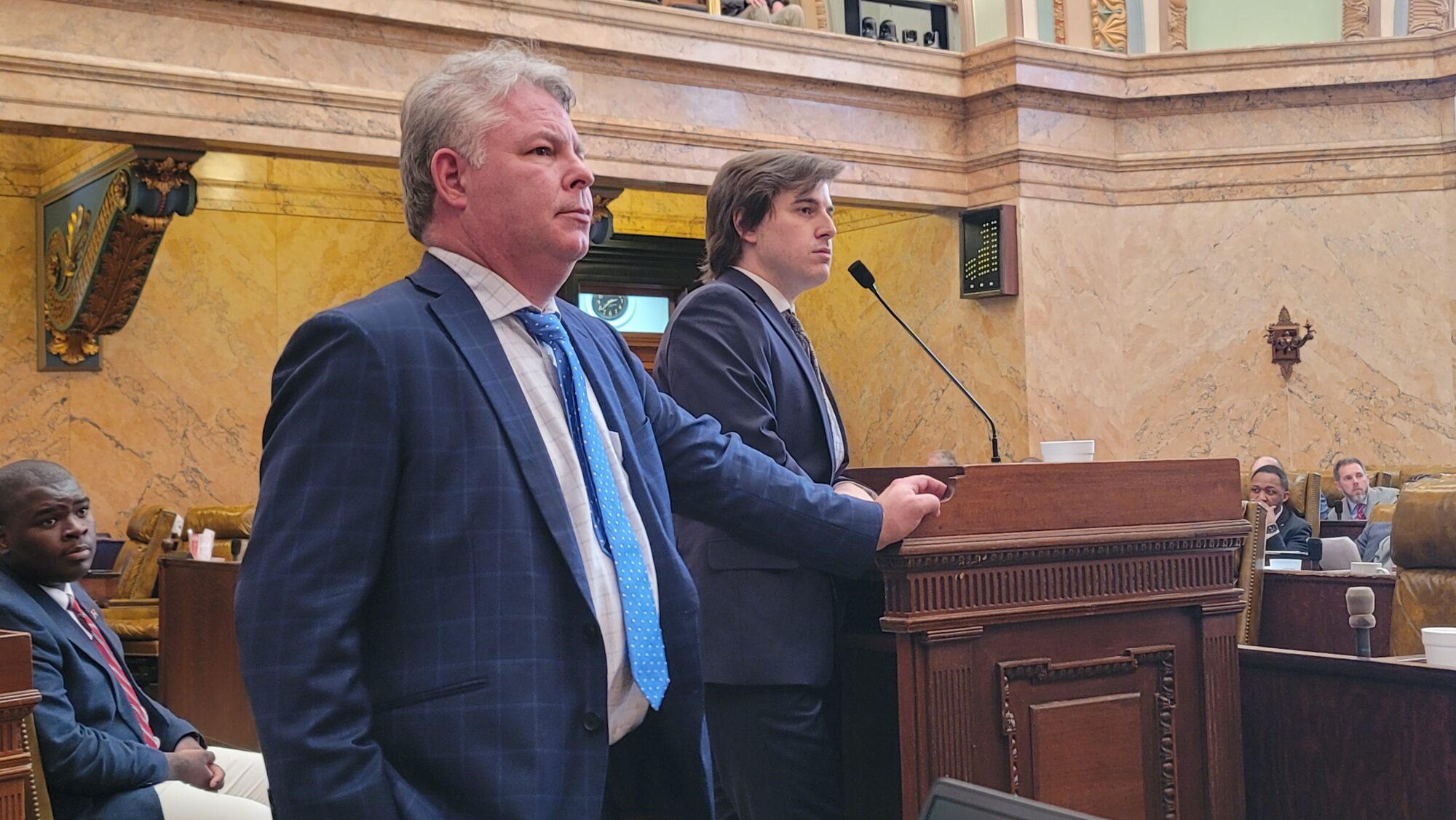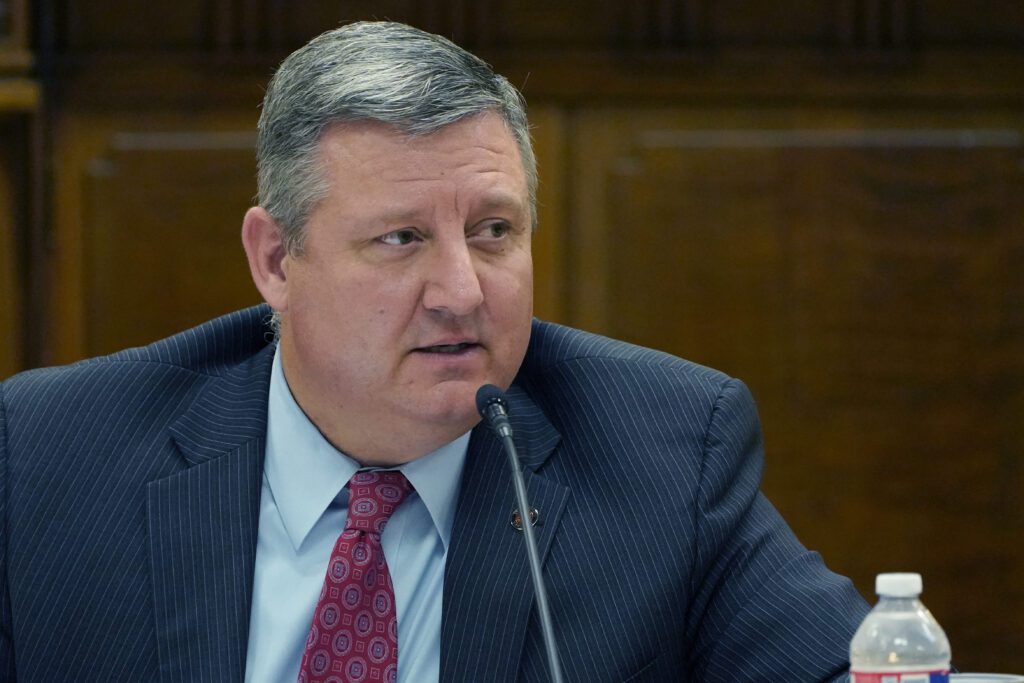[ad_1]

From left, Rep. Rob Roberson and Rep. Kent McCarty current HB 1453, which might substitute the present MAEP funding method with the INSPIRE Act, to the ground of the Home of Representatives on Wednesday.
(Picture by Jeremy Pittari | Magnolia Tribune)
The proposed new INSPIRE Act within the Home may add $240 million to Ok-12 funding whereas the Senate’s tweaks to MAEP may enhance training spending by $210 million.
Two payments that will change the best way Mississippi’s training funding system operates have survived the legislative deadline for committees to report out normal payments. One other invoice that would arrange a type of public college alternative gained some traction on Tuesday.
Senate Invoice 2332 and Home Invoice 1453 handed out of committee of their respective chambers earlier than Tuesday’s deadline. Each goal to vary the best way the state’s training system is funded.
HB 1453, also called the Investing within the Wants of College students to Prioritize, Influence and Reform Training (INSPIRE) Act of 2024, would create a weighted system supporters imagine would higher fund the state’s Ok-12 training system.
Authored by State Rep. Rob Roberson (R-HD 43), chairman of the Home Training Committee, the invoice was the primary to be submitted this session that tackled what many lawmakers imagine to be the antiquated and ineffective Mississippi Ample Training Program, or MAEP funding method that was established in 1997.
If handed, INSPIRE will substitute the present MAEP method, probably offering a further $240 million in training funding and guaranteeing college districts that want essentially the most funding will obtain it, significantly these with a decrease advert valorem tax base. Meaning some districts will see much less funding because the maintain innocent provisions expire inside 4 years as a part of the invoice, however districts in most want will see funding will increase.
Faculty districts with the strongest tax bases will get much less in state funding, stated Home Training Committee Vice Chair State Rep. Kent McCarty (R-HD 101) after the invoice was launched on the Home ground on Wednesday. Situations the place a district would get much less funding via the INSPIRE Act are these at present benefitting from maintain innocent provisions underneath MAEP. INSPIRE would set a four-year time-frame the place the maintain innocent provisions would run out incrementally every year. Maintain innocent provisions profit districts with declining enrollment numbers.
Rep. Roberson’s funding method within the INSPIRE Act will increase the bottom quantity of $6,650 per pupil to $6,600, after which applies weighted percentages above that determine for particular metrics. As an example, a weight of 30% above the bottom quantity is utilized for low-income college students and 20% is utilized for college students who’re studying English as a second language. The best of weights cowl the varied disabilities a pupil might face, whereas the bottom of weights present funding to make sure gifted courses are provided. There are percentages included for Profession and Technical Training programs and for districts with lower than 8 college students per sq. mile to help these with sparse populations.
Wednesday afternoon, after greater than an hour of debate on the Home ground, the invoice handed by a vote of 92-13.
Within the Senate, SB 2332, authored by Senate Training Committee Chairman State Sen. Dennis DeBar (R-SD 43), retains the construction of MAEP however adjusts the method in such a method in order to offer a further $210 million to the training allocation whereas offering superintendents and different college district directors with a clearer monetary image to plan for staffing and different bills previous to the beginning of the varsity yr.

DeBar’s invoice is much like laws he launched in the course of the 2023 session which died within the Home of Representatives.
As beforehand reported, SB 2332 proposes for every of the fiscal years between the recalculation of the bottom pupil value, the bottom pupil value be elevated by an quantity equal to 25 % of the bottom pupil value for the earlier fiscal yr, multiplied by the twenty-year common annual change within the fee of inflation. The present annual development issue for non-recalculation years is 40 %.
One other change to MAEP proposed within the Senate invoice pertains to the native contribution offered by every college district, rising it from the present fee of 27 % or 28 mills to 29.5 % or 28 mills, whichever is much less. The aim is to make it extra equitable for all college districts.
The Senate has not but taken up SB 2332 on the ground.
Faculty Alternative variation invoice
A college alternative invoice was additionally handed this week, and made it via the deadline course of.
SB 2691, additionally authored by Senate Training Committee Chair DeBar, was taken up within the Senate Training Committee Tuesday. It proposes modifications to present statutes that will permit a pupil to attend a public college district apart from the one they’re assigned, successfully making it simpler by taking away the veto energy the coed’s present college district now holds. Nevertheless, the receiving college district will nonetheless be tasked with accepting the switch request by the district’s subsequent Faculty Board of Trustees assembly. If that matter will not be taken up by the Faculty Board at the moment, the request is robotically denied.
Sen. DeBar stated that earlier than a faculty district can take into account accepting a switch request, the district must decide what number of college students it may well successfully educate inside the district earlier than contemplating the acceptance of any switch pupil.
If the coed lives greater than 30 miles from the switch college, the household might be accountable for offering transportation to the varsity. There isn’t any restrict on the gap of a faculty a pupil can switch to.
Any MAEP {dollars} for that pupil will comply with them to the brand new district, and if tuition is required, will probably be as much as that district to find out that value, Sen. Debar added.
In relation to restrictions on when college students athletes can be a part of a staff on the new college, the invoice would make a change to the Mississippi Excessive Faculty Athletics Affiliation’s present rule, which states if a pupil transfers in the course of a faculty yr, they’re ineligible to play a sport on the new college for a time period of 1 yr. DeBar’s laws would permit that pupil to be eligible to hitch an athletics program on the new college within the fall of the next college yr.
“So, if a pupil performs soccer within the fall at Greene County you’ll be able to’t switch to Petal or Sumrall to play baseball within the spring. Your athletic eligibility is decided by your fall enrollment,” Sen. DeBar stated. “I imagine that at present the highschool athletic affiliation requires you to sit down out a yr for those who switch. This eliminates that prohibition. We don’t need college students to be punished for transferring to a faculty that she or he needs to switch to.”
The invoice now awaits consideration by the total Senate.
[ad_2]
Source link



